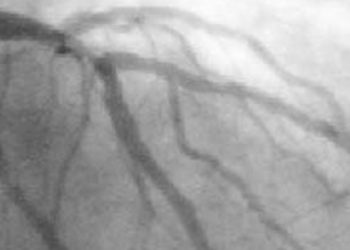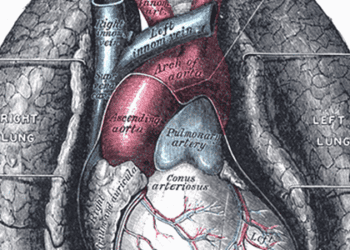Relative risk of heart failure from traditional risk factors is greater in younger than in older adults
1. Hypertension, diabetes, smoking, atrial fibrillation, and previous myocardial infarction were associated with a higher risk of incident heart failure in younger adults (<55 years) compared to elderly participants (≥75 years).
2. There were no interactions between age and body-mass index or glomerular filtration rate with respect to the incidence of heart failure.
Evidence Rating Level: 2 (Good)
Study Rundown: Heart failure is one of the most prevalent causes of mortality in the United States. While the risk factors of heart failure are well characterized, the temporal relevance of such risk factors are not well understood. This study found that traditional risk factors, such as hypertension, diabetes, current smoking status, atrial fibrillation, and previous myocardial infarction, led to higher risks of heart failure in younger individuals as compared to elderly individuals. Though the higher absolute risk of heart failure in older populations has led to a greater emphasis on care in this population, these findings show potential value in directing some clinical focus to the alteration of modifiable risks in younger individuals. This study uses data from three large observational cohorts such that the study population is quite large and allows for a significant length of follow-up for the study cohort. Nevertheless, this study was observational in nature meaning the association between age, traditional risk factors, and incidence of heart failure remains correlational. Furthermore, heart failure was a relatively rare outcome in younger populations so the prevalence of such disease incidence may harm the certainty of risk estimations.
Click to read the study in the BMJ
Relevant Reading: Epidemiology and risk profile of heart failure
In-Depth [retrospective cohort]: This study utilized three cohorts including the Framingham Heart Study (FHS, n=9877), the Prevention of Renal and Vascular Endstage Disease (PREVEND, n=8115) study, and the Multi-Ethnic Study of Atherosclerosis (MESA, n=6683) all of which included baseline examinations where all individuals were followed for at least 15 years. Survival and heart failure incidence was analyzed via Kaplan-Meier curves and further assessed via log-rank tests. Multivariable Cox models, accounting for several covariables (e.g. body mass index, sex, lipid levels, smoking status, atrial fibrillation), were used to derive mean hazard ratios with 95% confidence intervals as a means of examining the association of risk factors with incident heart failure.
Of the 24,675 individuals observed in this study, the median follow-up was approximately 13 years. In total, 138/11,599 (1%), 293/5,587 (5%), 538/5,190 (10%), and 412/2,299 (18%) of young (<55 years), middle aged (55-64 years), old (65-74 years), and elderly (≥75 years) individuals, respectively, developed heart failure. Hypertension (hazard ratio [HR]: 3.02 [2.10-4.34] in young vs. 2.19 [1.76-2.73] in elderly), diabetes (HR: 3.86 [2.39-6.23] in young vs. 1.98 [2.59-2.46] in elderly), current smoking (HR: 2.58 [1.83-3.63] in young vs. 1.43 [1.15-1.177] in elderly), atrial fibrillation (HR: 4.74 [1.44-15.6] in young vs. 2.31 [1.67-3.21] in elderly), and previous myocardial infarction (HR: 3.30 [1.77-6.14] in young vs. 2.92 [2.28-3.74] in elderly) all conferred a greater relative risk of heart failure incidence in younger adults compared to elderly participants. While absolute risk of heart failure was higher in elderly participants compared to younger (18% vs. 1%, respectively), the overall population attributable risk of heart failure due to traditional risk factors was higher in younger (75%) than elderly participants (53%).
Image: PD
©2020 2 Minute Medicine, Inc. All rights reserved. No works may be reproduced without expressed written consent from 2 Minute Medicine, Inc. Inquire about licensing here. No article should be construed as medical advice and is not intended as such by the authors or by 2 Minute Medicine, Inc.







